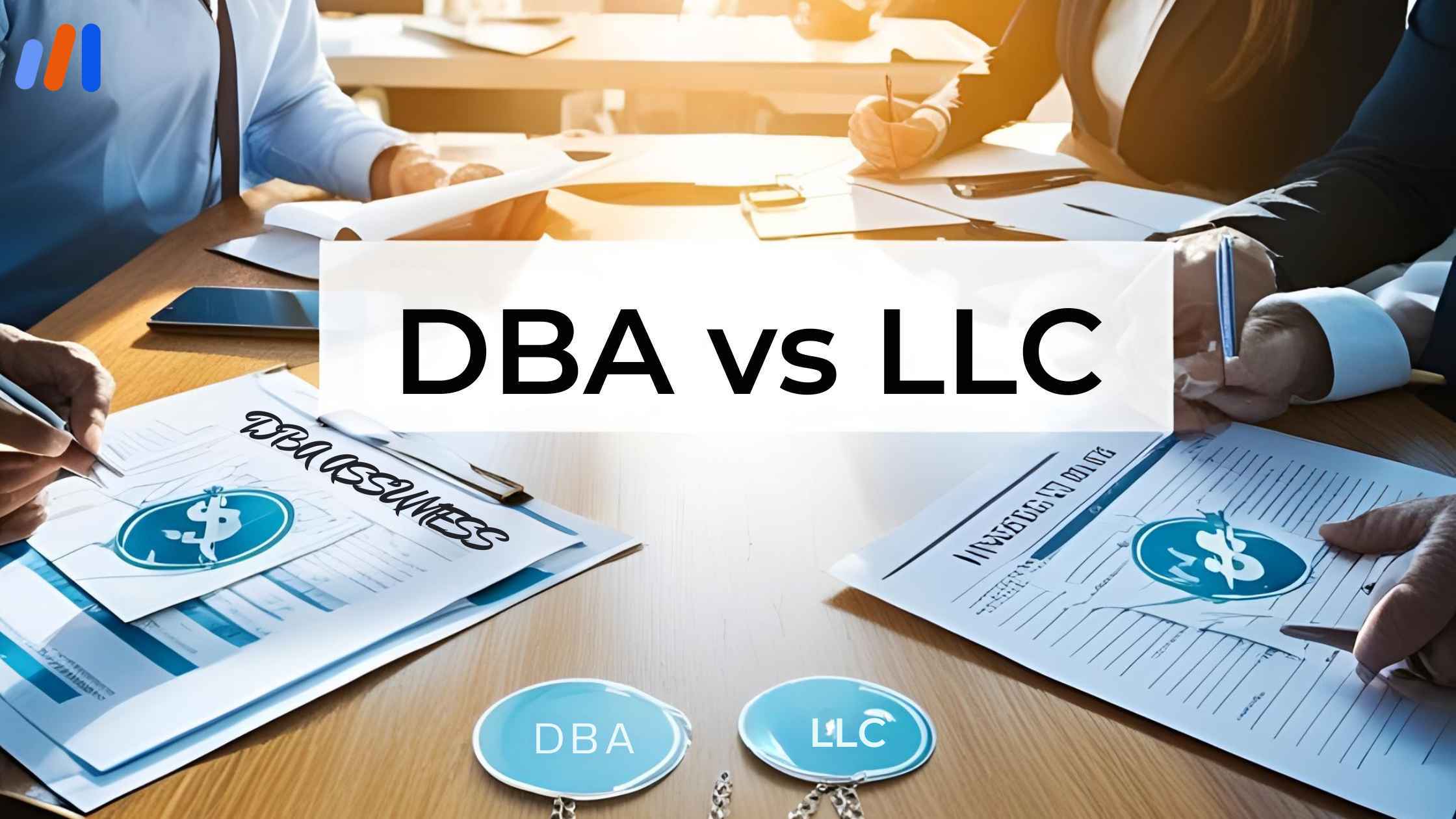Opening a new business can be both thrilling and daunting, but it comes with making critical choices that will define your brand, legal structure, taxes, and liability.
As with any new venture, entrepreneurs often ask themselves, “DBA vs LLC: which is better?”Whether you’re a freelancer, own a small business, or want to start a brand-new company, it is important to grasp the difference between a DBA (Doing Business As) and an LLC (Limited Liability Company).
This guide will outline each option and provide tips for evaluating what will best meet your aims and ambitions.
What Is a DBA?
DBA, or “Doing Business As”, is a registered name used by a business for marketing purposes that differs from its legal name. It is occasionally described as a “fictitious name” or “trade name.”
Let’s take the case of Jane Smith. If she runs a sole proprietorship, and “Jane’s Marketing Solutions” is her business name, then she would file for a DBA to operate legally under that title.
A DBA does not create a new legal entity; it permits a business to run under a name different from the owner’s name or the official name of the LLC.
Key Points:
- A DBA does not constitute a distinct legal framework.
- There is no liability protection.
- It is suitable for branding purposes or managing numerous businesses under one legal name.
What Is an LLC?
An LLC or Limited Liability Company is a legally recognized business organization that is set up at the state level. It provides personal liability protection to its owners (called “members”) and offers flexibility in how the business is managed and taxed.
An LLC can have single or multiple members. It can also be taxed as a sole proprietorship, partnership, S corporation, or C Corporation, depending on what is beneficial.
Key Points:
- LLCs protect personal assets from being affected by business debts.
- They need to be registered officially with the state.
- They provide more credibility and better flexibility to growing businesses.
DBA vs LLC: What’s the Difference?
The primary distinction between DBA vs LLC rests on the distinction of status and legal liability.
Without additional explanation, LLCs protect against liabilities while DBAs do not. LLC provides a stronger name protection guarantee, whereas DBAs are limited. Though both have low costs, DBAs require minimal paperwork while LLCs require a formal setup.
Should My Small Business Form as a DBA, LLC, or Both?
Everything revolves around your aspiration:
- As a freelancer or someone testing a business idea, a DBA should suffice.
- An LLC is a better option if you want to grow your business or protect your personal assets.
- You can also do both—register an LLC and file a DBA to operate under different brand names.
For example, an LLC named “Smith Consulting” could have several DBAs like “Tech Smith” or “HR Smith” depending on the services provided.
How Does a DBA Differ from a Sole Proprietorship?
A sole proprietorship is an unincorporated business owned by one person. The simplest form of business comes into existence the moment you start trading goods or services.
A DBA is not a type of business. Rather, it is a name. Many sole proprietors opt to use a DBA in a bid to hide their birth name. A DBA does not offer any legal protection or separation.
Takeaway: A DBA serves as an optional branding registration while a sole proprietorship is an automatic legal framework.
The 4 Differences between DBA vs LLC
Here is a summary of how DBA and LLC compare in the following areas:
- Legal Status: LLCs are legal entities, while DBAs do not exist as one.
- Liability: LLCs ensure your personal assets are safe, while DBAs do not.
- Tax Options: Moderate tax elections are provided for LLCs. For DBAs, taxes are based on the entity that is registered.
- Naming: Both allow you to name your business, however, only LLCs offer stronger state-level name protection.
Restrictions on a DBA Name
When registering a DBA business, there are a few restrictions:
- The name cannot contain terms “LLC”, “Corp”, or “Inc” unless the business has registered as such.
- Your DBA must differ from other registered names within the same jurisdiction.
- It should not give a false impression about the goods and services offered.
Restrictions on LLC Name
DBA names are less restrictive than LLC names:
- Must contain “LLC” or “Limited Liability Company.”
- Words that suggest affiliation with government bodies such as “FBI”, “Treasury”, etc., are not permitted.
- It must not duplicate other registered businesses in your state.
- You must search through the Secretary of State’s website for business name registrations before making any submissions.
DBA Advantages:
- Filing is very affordable and simple.
- Helpful in advertising and marketing.
- No separate tax filings are necessary.
DBA Negatives:
- No liability security.
- Limited rights to the name adopted.
- No business framework is formed.
LLC Positives:
- Safeguard non-business assets.
- Diverse strategies for taxes.
- Increased respect from financial institutions and customers.
LLC Negatives:
- More expensive to set up and maintain.
- Mandatory yearly submission of reports and payments (depends on the state).
- More difficult to create.
When to Pick a DBA
DBA is ideal when:
- You run a sole proprietorship or a partnership.
- You wish to advertise using a different name.
- You are experimenting with a product or brand.
- You have an LLC and want to broaden your scope under a different name.
When to Pick an LLC
Choose an LLC when:
- You wish to dissociate personal and business funds.
- You are looking for tax flexibility and want to be taken seriously.
- You want to bring on additional business partners or investors.
- You want strong protection against risks while focusing on growth in the long term.
How Do I Determine If a DBA or LLC is Better for My Business?
Consider the following questions:
- Do I need personal liability protection?
- Am I willing to spend a little more to make my business formal?
- Am I going to scale my business or intend to keep it small?
- Do I need to operate under different brand names?
If you lean towards protection, flexibility, and growth, then an LLC will work well for you. But if you are focused on simplicity, a DBA would suffice.
Tax Flexibility: DBAs vs LLCs
The difference between DBA vs LLC has a major impact on your taxes.
A DBA does not change tax structure, meaning you will pay taxes based on your business, be it a sole proprietorship, partnership, etc.
An LLC has several tax options to choose from:
- Default: Pass-through taxation
- Elect to be an S Corp or a C Corp
- Possible savings on self-employment taxes if an S Corp is elected
Pass-through taxation makes LLCs a powerful instrument.
Operating as a DBA and an LLC Together
Yes, that is absolutely possible!
DBA-registered LLC owners do this in order to:
- Use names for various products or services.
- Work in different parts of the country.
- Rebrand without having to go through the process of starting a new LLC.
Keep in mind that every DBA must be registered in the locations where business is conducted.
FAQs: DBA vs LLC
1. Is it possible to switch my DBA for an LLC at a later date?
This is entirely possible. You may eliminate your DBA and create an LLC at any time. That said, this is not a conversion—a change in structure. You’d be starting anew as a different legal entity.
2. Is it possible to obtain an EIN using a DBA?
Yes, an EIN can be applied for irrespective of having a DBA. However, it depends on the type of business you have, which may be a sole proprietorship, partnership, and so on, but not a DBA.
3. Is a separate bank account required for a DBA?
A separate bank account for a DBA is not a necessity; however, it is useful. Its absence does not improve liability protection, but it does simplify bookkeeping and increase professionalism.
4. Is registration needed for both DBA and LLC?
Both are required to be registered. A DBA is registered at the county or state level, depending on where you do business. An LLC is registered with your state government.
5. Can I have the same name for a DBA and LLC?
If the name meets your state’s requirements and is available, yes. However, an LLC title would usually contain the term “LLC”, whereas the DBA name would be more branding-oriented.
Concluding Thoughts: DBA vs LLC – Which One Is Best For You?
DBA vs LLC have different functions, which determine how you set your business up, and therefore, a proper understanding is vital. A DBA may be well suited for preliminary testing and low-cost branding, while an LLC offers legal protection and potential for scaling.
If you’re looking to make a significant shift in your business strategy, an LLC might be the smartest move you’ll make.
An LLC can be formed faster with the added support. We at Easyfiling simplify the process as we handle your paperwork so you can focus on growing the business. Reach out to us today to get started!
File Your LLC Today
25$ off with a coupon
Lock in EasyFiling's transparent rates and get lifetime compliance support at no extra cost.
Get Started Now








